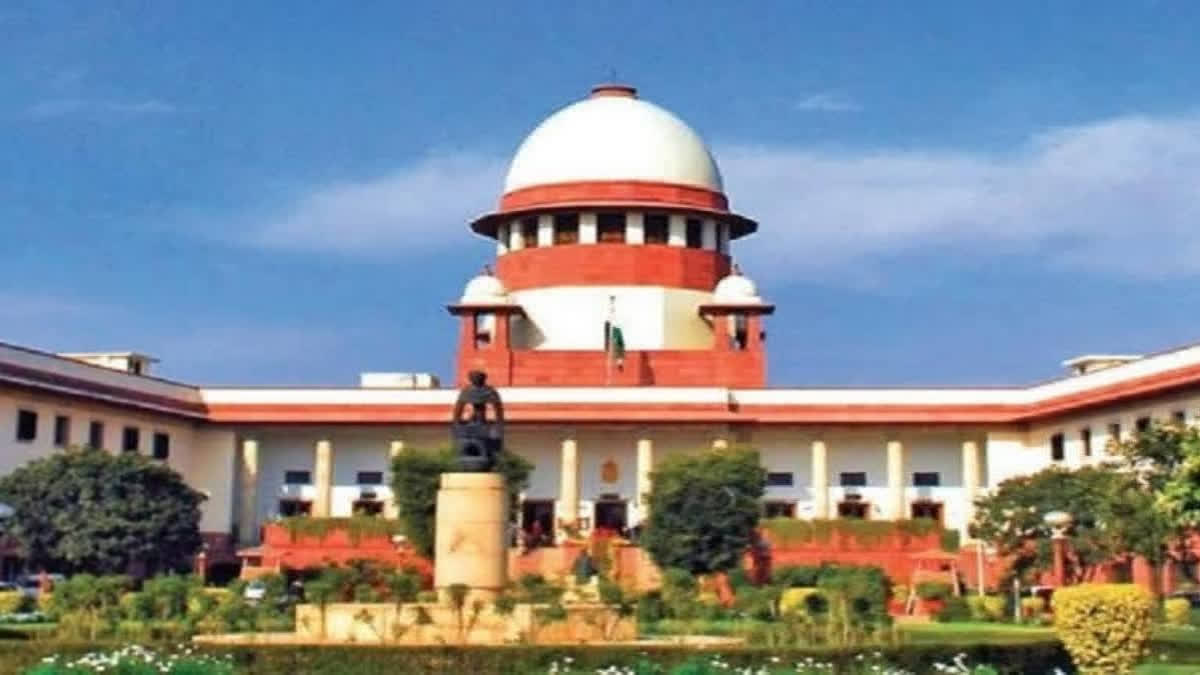New Delhi:The Supreme Court has said that conviction cannot be based on conjectures and surmises, while ordering the release of a man in a murder case, saying that it is not permissible that the testimony of the sole witness is used to convict a person and the same testimony is used to grant benefit to the two co-accused in the case.
A bench comprising justices BR Gavai and KV Viswanathan said, “In the present case when the High Court concludes that it is difficult to believe that Kovilraj (prosecution witness) could have witnessed the incident in the manner narrated by him and granted benefit of doubt to accused Nos 2 and 3, the conviction of accused No 1 based on the evidence of the very same witness only based on conjectures and surmises, in our view, is not permissible."
The bench noted that Kovilraj is the father of the deceased and is an interested witness. “No doubt that merely because a witness is an interested witness, it cannot be grounds to discard the testimony of such a witness. However, the testimony of such a witness has to be scrutinised with greater caution and circumspection," said the bench.
Citing the judgment by the Madurai Bench of Madras High Court, on November 1, 2019, the bench said while disbelieving the testimony of Kovilraj regarding the other two co-accused, the High Court has taken note of the fact that the incident occurred 300 metres away from the church and that could not have enabled Kovilraj to have witnessed the overt act that is attributed to the two co-accused. “However, the appellant herein involved in the same overt act has been convicted based on the same testimony of Kovilraj," said the bench, in a judgment delivered on Friday.
The bench said no doubt that a conviction could be based on the sole testimony of a witness but equally, the principle that falsus in uno, falsus in omnibus (false in one thing, false in everything) is not applicable in Indian criminal jurisprudence. “However, in the present case, based on the sole testimony of the same witness Kvilraj, the appellant herein has been convicted and the other two accused, involved in the same incident have been acquitted by giving them the benefit of the doubt”, said the bench.
The apex court judgment came on an appeal filed by the appellant, George, challenging the High Court order, which upheld his conviction in the murder case. The FIR was registered in May 2015, at Police Station Sathankulam, District Thoothukudi by Kovilraj.
Kovilraj said that he is a church member and choirmaster in Immanuel Church at Ananthapuram. He stated that he was in favour of Arputharaj in the Diocese election, due to which the appellant, who supported the rival faction of Pushparaj entered into a quarrel with his son (Praveen Kumar) about a year before the day of the incident.
It was alleged that on the day of the incident, Goerge and two other accused abused the complainant’s son in filthy language while he was standing in front of the church and chatting with his friends. Later, Goerge took out a knife, which he had hidden in his hip pocket, upon which the complainant’s son ran to escape. He was chased by the three of them, however, he was caught by the accused. It is alleged that while the other two accused persons held the complainant’s son, the appellant hacked the knife forcibly on the left side of his neck. The complainant’s son was taken to the hospital, where he was declared dead.
The High Court found the evidence of Kovilraj unreliable regarding the two co-accused and therefore did not find it safe to convict them and granted them the benefit of the doubt. The High Court had observed that the evidence of Kovilraj insofar as the two co-accused are concerned appears to be unnatural.
The High Court had also observed that, since the incident had taken place around 300 metres away from the church, it is difficult to believe that Kovilraj could have witnessed the overt act attributed to two co-accused. “However, strangely, the High Court, based on the very same evidence of Kovilraj (PW-1), has believed it qua the appellant herein and confirmed his conviction”, said the apex court, while setting aside the high court judgment. The apex court said the appellant is acquitted of all the charges levelled against him and is directed to be released forthwith if not required in any other case.
Read more: ‘Media Shouldn’t Exaggerate’: SC Irked Over News Reports On Hearing Over ‘VIP’ Visits At Temples
